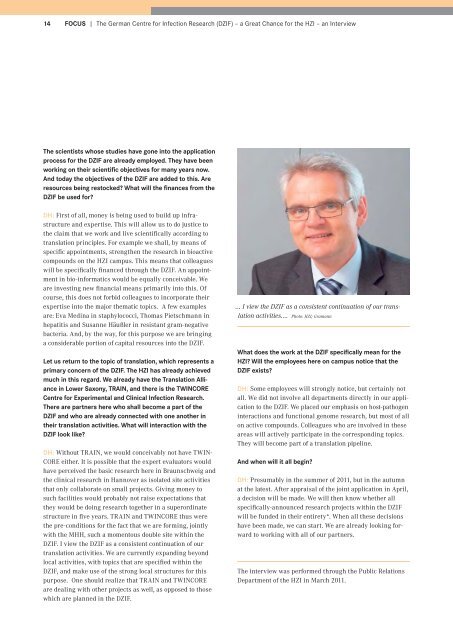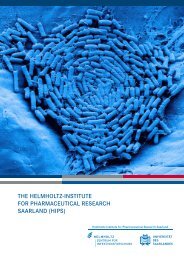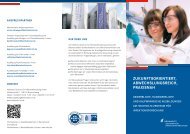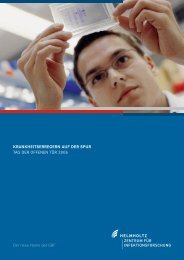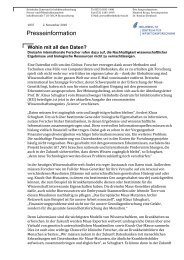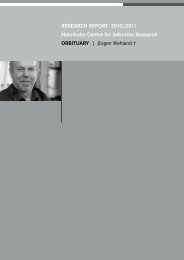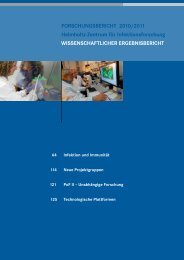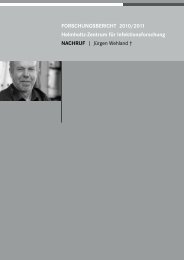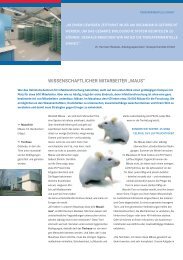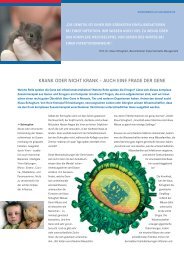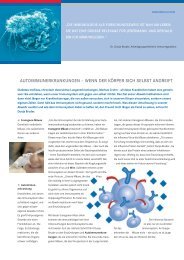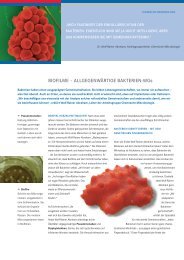Research Report 2010 2011 - Helmholtz-Zentrum für ...
Research Report 2010 2011 - Helmholtz-Zentrum für ...
Research Report 2010 2011 - Helmholtz-Zentrum für ...
You also want an ePaper? Increase the reach of your titles
YUMPU automatically turns print PDFs into web optimized ePapers that Google loves.
14 FOCUS | The German Centre for Infection <strong>Research</strong> (DZIF) – a Great Chance for the HZI – an Interview<br />
The scientists whose studies have gone into the application<br />
process for the DZIF are already employed. They have been<br />
working on their scientific objectives for many years now.<br />
And today the objectives of the DZIF are added to this. Are<br />
resources being restocked? What will the finances from the<br />
DZIF be used for?<br />
DH: First of all, money is being used to build up infrastructure<br />
and expertise. This will allow us to do justice to<br />
the claim that we work and live scientifically according to<br />
translation principles. For example we shall, by means of<br />
specific appointments, strengthen the research in bioactive<br />
compounds on the HZI campus. This means that colleagues<br />
will be specifically financed through the DZIF. An appointment<br />
in bio-informatics would be equally conceivable. We<br />
are investing new financial means primarily into this. Of<br />
course, this does not forbid colleagues to incorporate their<br />
expertise into the major thematic topics. A few examples<br />
are: Eva Medina in staphylococci, Thomas Pietschmann in<br />
hepatitis and Susanne Häußler in resistant gram-negative<br />
bacteria. And, by the way, for this purpose we are bringing<br />
a considerable portion of capital resources into the DZIF.<br />
Let us return to the topic of translation, which represents a<br />
primary concern of the DZIF. The HZI has already achieved<br />
much in this regard. We already have the Translation Alliance<br />
in Lower Saxony, TRAIN, and there is the TWINCORE<br />
Centre for Experimental and Clinical Infection <strong>Research</strong>.<br />
There are partners here who shall become a part of the<br />
DZIF and who are already connected with one another in<br />
their translation activities. What will interaction with the<br />
DZIF look like?<br />
DH: Without TRAIN, we would conceivably not have TWIN-<br />
CORE either. It is possible that the expert evaluators would<br />
have perceived the basic research here in Braunschweig and<br />
the clinical research in Hannover as isolated site activities<br />
that only collaborate on small projects. Giving money to<br />
such facilities would probably not raise expectations that<br />
they would be doing research together in a superordinate<br />
structure in five years. TRAIN and TWINCORE thus were<br />
the pre-conditions for the fact that we are forming, jointly<br />
with the MHH, such a momentous double site within the<br />
DZIF. I view the DZIF as a consistent continuation of our<br />
translation activities. We are currently expanding beyond<br />
local activities, with topics that are specified within the<br />
DZIF, and make use of the strong local structures for this<br />
purpose. One should realize that TRAIN and TWINCORE<br />
are dealing with other projects as well, as opposed to those<br />
which are planned in the DZIF.<br />
… I view the DZIF as a consistent continuation of our translation<br />
activities…. Photo: HZI; Gramann<br />
What does the work at the DZIF specifically mean for the<br />
HZI? Will the employees here on campus notice that the<br />
DZIF exists?<br />
DH: Some employees will strongly notice, but certainly not<br />
all. We did not involve all departments directly in our application<br />
to the DZIF. We placed our emphasis on host-pathogen<br />
interactions and functional genome research, but most of all<br />
on active compounds. Colleagues who are involved in these<br />
areas will actively participate in the corresponding topics.<br />
They will become part of a translation pipeline.<br />
And when will it all begin?<br />
DH: Presumably in the summer of <strong>2011</strong>, but in the autumn<br />
at the latest. After appraisal of the joint application in April,<br />
a decision will be made. We will then know whether all<br />
specifically-announced research projects within the DZIF<br />
will be funded in their entirety*. When all these decisions<br />
have been made, we can start. We are already looking forward<br />
to working with all of our partners.<br />
The interview was performed through the Public Relations<br />
Department of the HZI in March <strong>2011</strong>.


